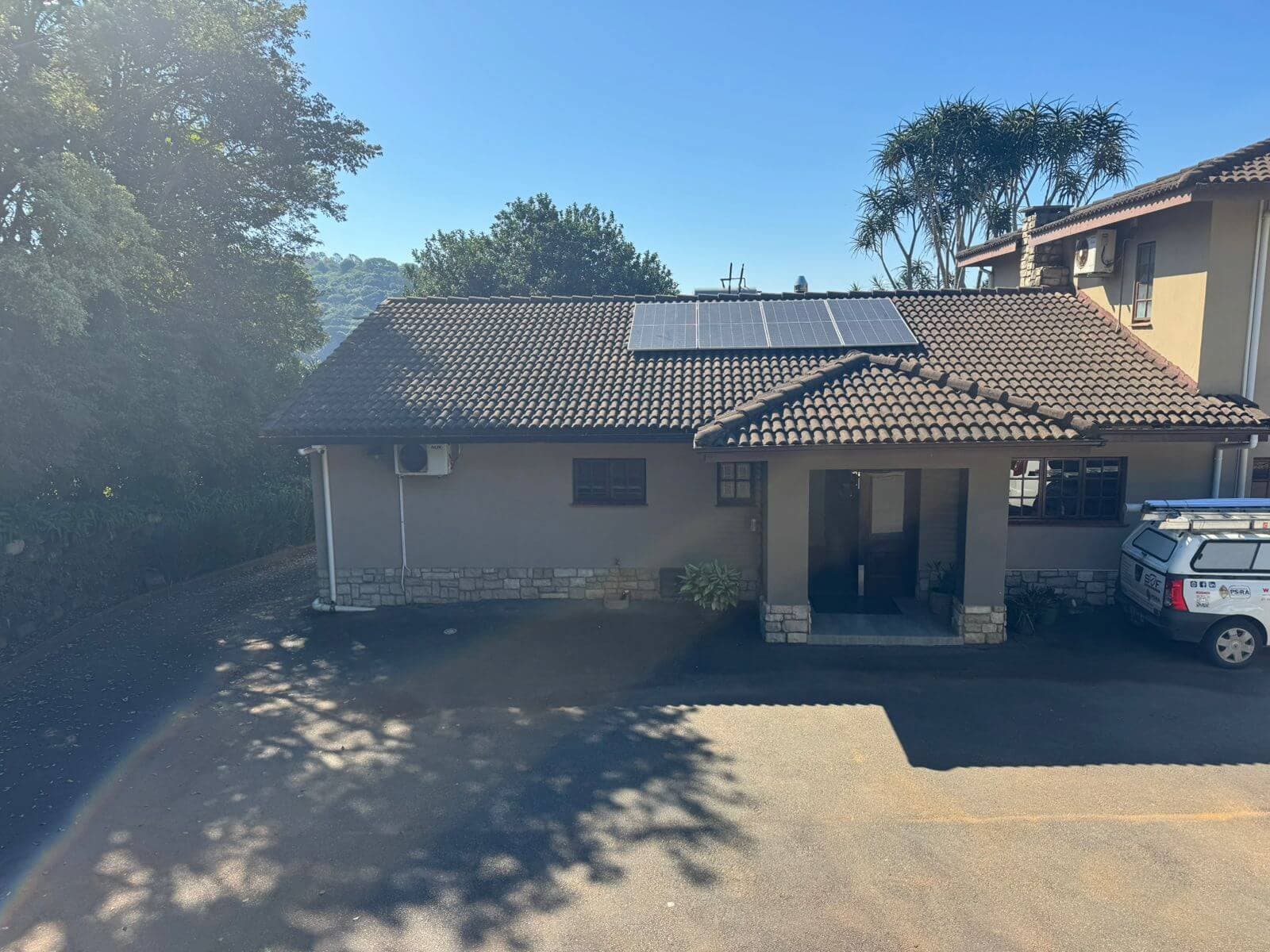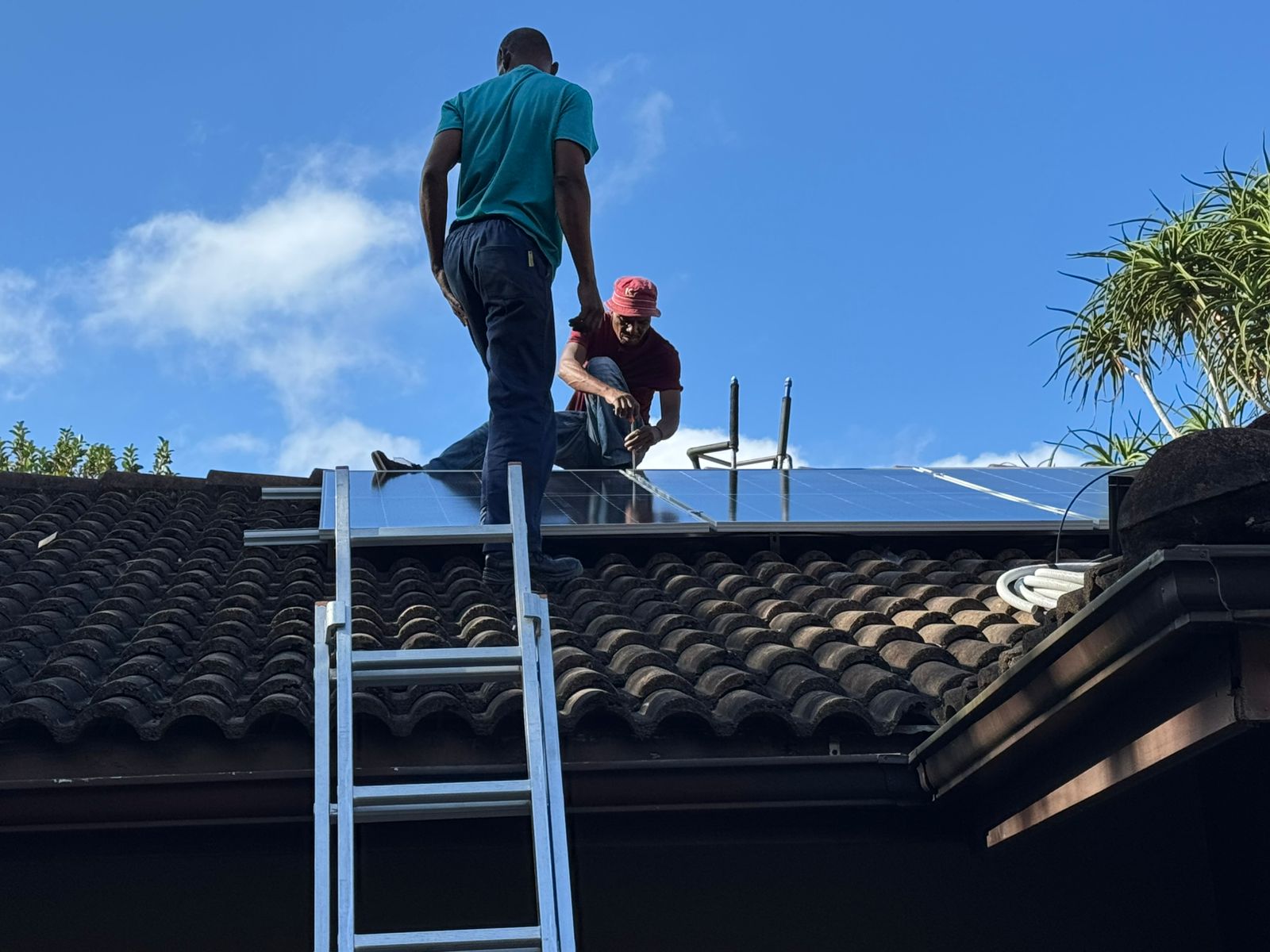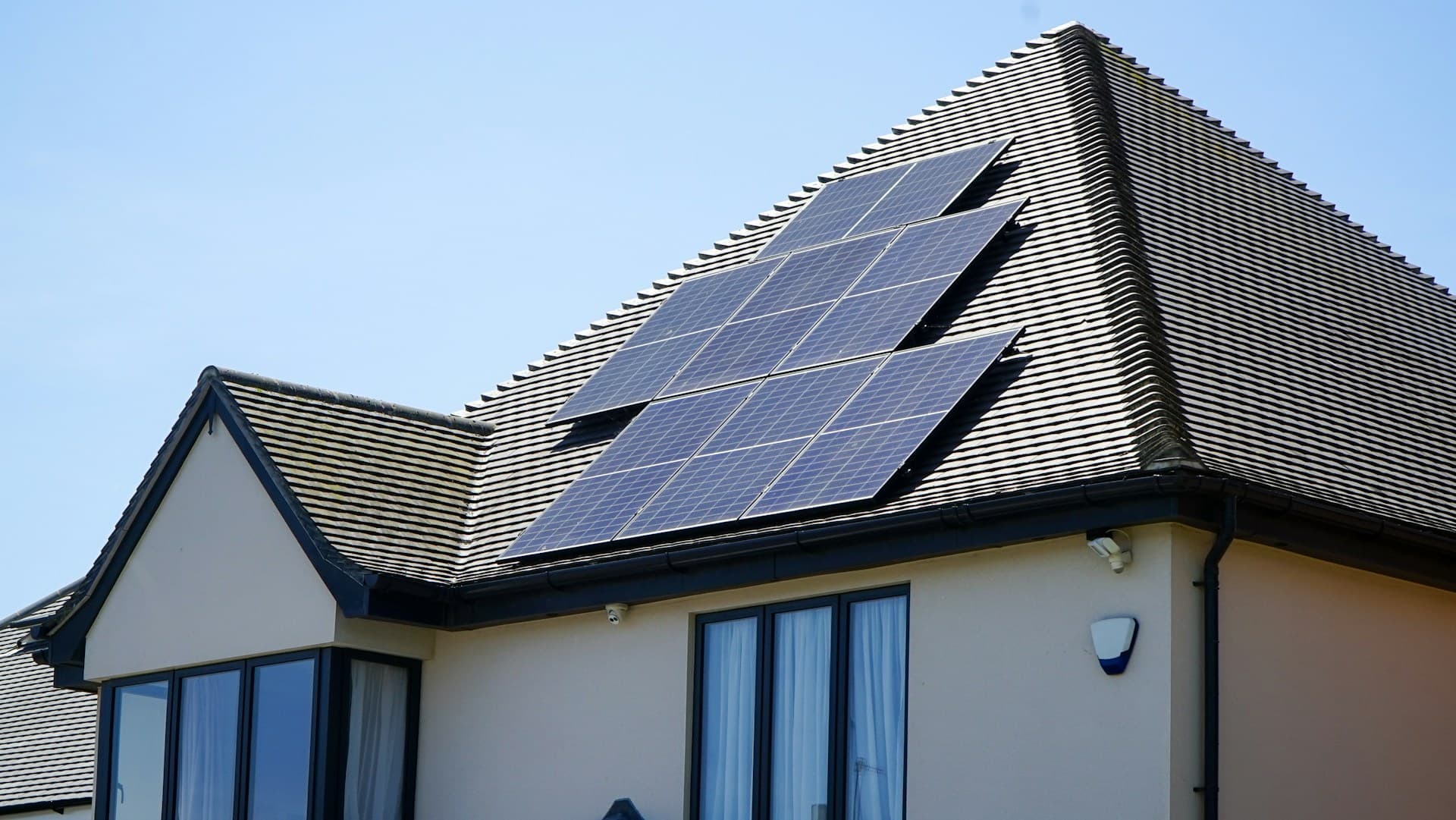

RESIDENTIAL SOLAR PANEL INSTALLATION COMPANY IN DURBAN
Home Battery Backup System
We provide complete solar systems for home use, including high-quality solar panels, inverters, and home battery backup solutions to ensure uninterrupted power. A home battery backup system is an intelligent way to store the excess solar energy your panels generate during the day and use it later when you need it most — such as during load-shedding, power outages, or at night. By adding a solar battery backup or inverter and battery backup system to your home, you can reduce your reliance on the Eskom grid, lower your electricity costs, and make your household more energy-independent.
At Eagle Eye Solar, we don’t believe in a one-size-fits-all battery backup power system. Every home battery backup solution we install is designed around your unique energy needs, usage patterns, and future goals. Whether you’re looking for a lithium-ion battery backup with a long lifespan and high efficiency, a more affordable lead-acid battery backup, or an eco-friendly saltwater battery option, our team will help you find the ideal match for your lifestyle and budget.
The lifespan and maintenance of a battery backup system depend on the technology and how it’s used. Lithium-ion batteries typically last between ten and fifteen years, require minimal maintenance, and are backed by long-term warranties. Lead-acid batteries are more affordable upfront but generally last between three and seven years and need regular upkeep to perform optimally. Saltwater batteries provide a sustainable alternative with minimal maintenance and safe, non-toxic operation. Factors such as temperature, depth of discharge, and charge cycles all affect battery backup lifespan and overall performance.
Choosing the right home battery backup system isn’t just about picking the biggest and largest capacity but rather it’s about finding the one that best suits your energy usage. With all our residential solar installations we start off with understanding the ‘why’ behind the request so that we can take this and build you a bespoke system that can provide optimal energy performance.
Benefits of Residential Solar Power
Reduced Monthly Electricity Bills
Reliable Independent Energy Supply
Sustainable Greener Energy Supply
Increased Residential Property Value

Solar Installations for Home
Different Types of Residential Solar Installations for Home in Durban
An on-grid solar energy system, also commonly known as a grid-tied solar setup, is directly connected to the main Eskom electricity supply. This is often one of the most cost-effective options for homeowners in Durban due to not needing any form of battery storage – but on the other hand the downside is that if there is loadshedding you don’t have any cover in place. This setup is ideal for homes that have a stable energy supply as it allows homeowners to draw power from the national grid and feed excess energy in the reverse direction.
An off-grid solar energy system, is completely independent from Eskom – which means that this system relies completely on the power generated from your solar panels and a larger enough battery storage setup to meet the energy consumption needs of your home. These types of systems are often built for homes in remote areas that may not have grid access or where the customer wants complete energy independence. Due to needing more parts in an off-grid system such as panels, inverters and batteries – these systems can often have a higher upfront cost.
A hybrid solar system combines the best of both worlds by having connection to the grid whilst also having battery storage to provide partial energy independence. Often with these setups customers choose a battery that has less capacity compared to an off-grid system as they are aiming to run essential appliances around their home during loadshedding. This is a popular choice across South Africa as it provides energy backup without having to go off the grid.
Solar Panels for Home Installation
Investing in solar panels for your home is one of the smartest ways to offset your electricity costs and add long term value to your property. One of the main advantages of installing solar is that there is an upfront cost but this system will work for multiple years so this should theoretically pay for itself over the long term. When installing solar panels, it’s crucial to position these in the correct location either on your rooftop or ground mounted systems and have the correct tilt angle to allow you to generate the maximise energy. At Eagle Eye Solar, we specialise in solar panel installations for homes across Durban and surrounding regions. Our team uses premium quality solar panels from trusted South African manufacturers to ensure maximum reliability and efficiency. Whether your panels are roof-mounted or part of a ground-mounted solar system, we’ll position them at the ideal tilt angle to capture the most sunlight and deliver the best energy output. When you choose us to install your solar panels, you’re not just getting a one-off product but a strategic energy partner who can also help maintain your system over its lifetime by performing regular maintenance.
Residential Rooftop Solar Panels
Residential rooftop solar panel installations are a cost effective and energy efficient solution for homes looking to adopt the change to solar power. Depending on which direction your property faces this may influence on what side of the roof the panels can be installed – ideally installing the solar panels on multiple roofs facing different directions will allow for maximum energy power to be generated. By converting your unused roof space into a clean energy source, homes can significantly reduce electricity costs and lower reliance on the grid whilst also increasing the value of your property over time.
Home Solar Panel Maintenance
Regular maintenance of your home solar panels is key to keeping your system running efficiently and getting the most out of your investment. While solar panels require minimal upkeep, it’s important to check for dirt, debris, or shade that may affect performance. A simple clean with water every few months and an annual inspection from a professional can help identify any issues early, such as loose wiring or panel degradation. Keeping your panels in good condition not only ensures optimal energy output but also extends the lifespan of your solar system, protecting your long-term savings and energy independence.
Frequently asked questions
How much does a home solar system cost?
The cost of a home solar system can vary depending on a variety of factors such as the number of solar panels required, the type of inverter used and whether or not you require some form of battery storage. This means that there is no fixed price as the price can vary depending on what the homeowner chooses – also at Eagle Eye Solar we always try to build bespoke systems tailored to your energy needs so that we can answer the ‘why’ behind the installation and ensuring the client is satisfied. The best way to get an accurate price estimate is to get in contact with our team who can conduct a solar site assessment and suggest the best options for you.
How many solar panels are needed to power a home?
It’s difficult to provide one straight answer to this question as this often depends on multiple different factors such as your current energy usage and what types of appliances you aiming to run during loadshedding, the size of your rooftop or other areas that may be applicable to install solar panels, as well as the sunlight your property receives. On average, a client would maybe install around 8-12 panels but as mentioned this does depend on what you trying to power and your current energy usage from the grid. A key factor to consider when making the decision to switch to solar is your current monthly electricity usage, measured in kilowatt-hours (kWh). This probably goes without saying, but the more energy your residential property consumes the more solar panels you’ll need. The amount of sunlight that your property receives may also influence the number of solar panels that need to be installed. If you receive consistent sunlight over large parts of the day then you’ll likely require fewer panels to generate the same amount of electricity compared to homes in areas with limited daytime sunlight exposure.
How does home solar power work?
Solar panels on your roof work like tiny energy factories that capture sunlight and turn it into electricity. Then, this power goes through a device called an inverter, which changes it into the kind of current your home in Durban can actually use to run things like your lights, appliances, and other essentials. If your system produces extra electricity, you can store that surplus in a battery to use later that can be particularly useful during load shedding or unexpected power cuts.
Do solar panels increase home value?
When installing solar panels at your home, you are essentially adding an asset that can help reduce your monthly electricity bills. This can be a huge plus for potential buyers as they will understand that they can realise immediate savings and long-term protection from loadshedding. Buyers are increasingly looking for energy-efficient features, and a ready-to-go solar setup can make your home stand out. Of course, the exact impact can drastically vary depending on other factors such as the size and quality of your solar energy system, your location and the general condition of your property. At Eagle Eye Solar, our take would be that a solar energy system can definitely contribute but the wear and tear of your property and overall condition still needs to be the focus as solar is just an added benefit and likely won’t be the main selling point.
How do I calculate the right solar power system for my home?
Calculating the right solar power system for your home starts off with understanding your average electricity usage. This is normally calculated over the past 12 months so that you can work out an average instead of just focusing on one singular month. The figure you should be focusing on is how many kilowatt-hours (kWh) you use each month as this can give an indication on how much energy your solar panels need to produce. It also depends on whether you want to go off the grid or only want partially to reduce your monthly bills but supplementing some of this with solar energy.
Is 5kw enough to run a house?
Yes, a 5kW solar energy system can often generate enough power to run an average size home, typically suitable for powering a 3–4-bedroom homes. This ultimately does depend on your household’s current energy consumption and usage pattern which can be calculated by taking the kilowatt-hours (kWh) consumed per month. A 5kW system can generate around 20kWh of electricity per day or 4,250kWh of electricity per year, which can cover the needs of a small to medium sized house. An article published by Africa Energy stated that a small family home has a monthly usage of a 400-650kWh whilst a medium sized homes draws on average between 700-1100kWh. On average a 5kW solar powered system could generate around 600kWh per month which fits into the category of small to medium sized homes, but actual electricity demands and appliances you trying to run such as aircons or ovens can influence this.
What is the average residential solar system size?
We recently completed a solar energy installation for a home in Durban to help them lower their energy costs and become more self-sufficient. Our client wanted ten solar panels to be installed which was paired with an Axil LiFePo4 battery and an Axil inverter. This was a hybrid system so they are still connected to the main Eskom grid, but they now also have the added peace of mind that they can draw electricity from there solar system during some parts of the day and ultimately to keep them connected during loadshedding or power failures. On average, we would say our clients normally opt for somewhere between 8 – 10 solar panels which is paired with battery storage and a solar inverter.
